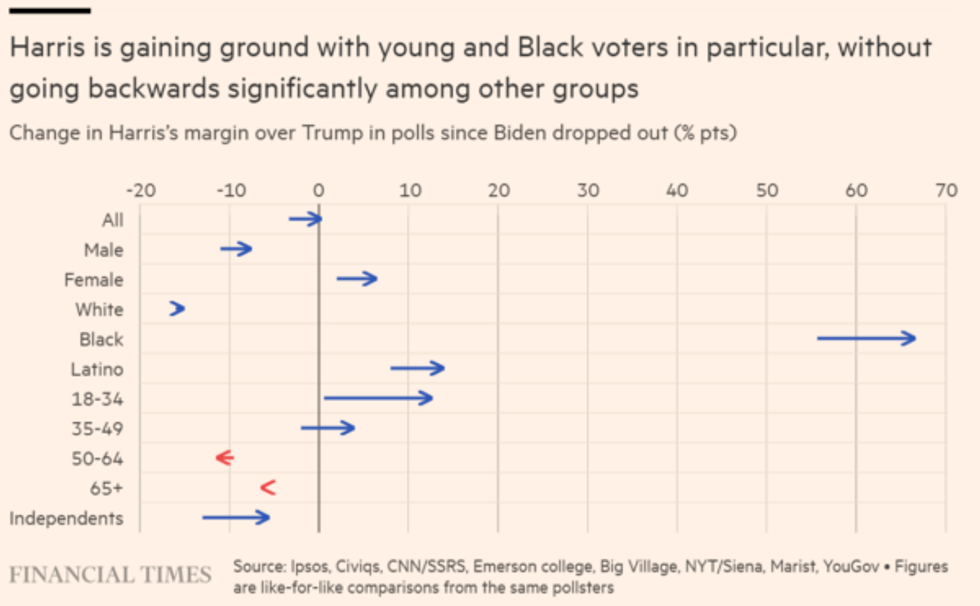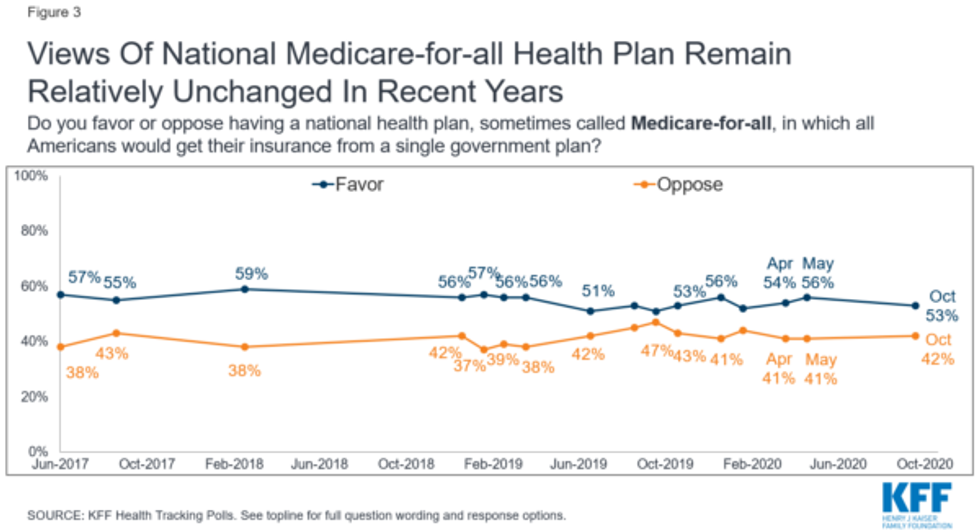 Kamala Harris is gaining ground against Donald Trump with most sub-groups of voters (Financial Times, 7/26/24).
Kamala Harris is gaining ground against Donald Trump with most sub-groups of voters (Financial Times, 7/26/24).
‘What Harris needs to do’
So the editorial board decided it was time to weigh in. A day after Biden’s announcement that he was withdrawing, it published the editorial “What Harris Needs to Do, Now, to Win” (7/22/24).
In the piece, the board implores Harris to abandon progressive policy priorities such as “widespread student debt cancellation” and “nationwide rent stabilization” that Biden has backed during his term as president. Instead of promoting these policies, according to the board, Harris should mercilessly turn her back on the progressive wing of the party:
Ms. Harris should both resist activist demands that would push her to the left and ignore the social media micro-rebellion that will follow. Ms. Harris’s pick of running mate could be a revealing early indicator, too. Tapping a politician likely to appeal to the median voter would serve her—and the country—best.
This, we are to think, is not simply about the more conservative policy preferences of the members of the Post’s board. It is cold, calculated and smart electoral strategy. After all, everyone knows that America is a center-right country, and general election voters would never get behind a progressive platform. (Never mind that Biden adopted a slate of progressive policy positions in a desperate attempt to resuscitate his ailing campaign, precisely because these policies are so popular with the general electorate.)
Misty memories of 2020
Not only that, but remember what happened in 2020? In the Post’s telling, during that presidential primary, Harris
tried to play down her record as a tough-on-crime California prosecutor and embrace the progressive left of the Democratic Party, backing policies that lacked broad appeal, such as Medicare-for-all. She did not make it out of 2019 before folding her campaign.
The implication here seems to be that support for progressive policies hampered Harris’s campaign. A strange hypothesis, given that progressives such as Bernie Sanders and Elizabeth Warren did exceptionally well in that primary, and only lost after moderates consolidated around Biden in a last-minute tactical alliance.
Medicare-for-all, meanwhile, posted majority support from the American public throughout the 2020 primary season, and had garnered majority support for years before that, according to the Kaiser Family Foundation. To be fair to the Post, the polling on this issue was incredibly sensitive to the framing of the question, so you could easily point to some poor results for the policy as well, often found in Fox’s (unsurprisingly biased) polling. But, unlike with many of the polls that returned unfavorable results, the wording used by Kaiser was eminently even-handed.
 Polling by Kaiser (10/16/20) finds that Medicare for All has remained broadly popular for years.
Polling by Kaiser (10/16/20) finds that Medicare for All has remained broadly popular for years.
In any case, what matters for the Post’s suggestion about Harris’s fate in the 2020 primary is not views among the general population, but views among Democrats. With that group, polls consistently found overwhelming support for Medicare-for-all. At best, then, we might call the Post’s claims here misleading, an attempt to pawn off opposition to a policy on the general public when, in fact, it’s really the paper that takes issue with it.
Ignoring full employment
The policies that the Post prefers Democrats to push are of a different sort, the Very Serious and bipartisan sort. Because only when Republicans also sign off on legislation is it any good. As the Post calls for a rightward turn from Harris, it celebrates the scarce moments of bipartisanship (sort of) over the last few years:
In the White House, Mr. Biden’s approach helped get substantial bipartisan bills over the finish line, investing in national infrastructure and critical semiconductor manufacturing. He also signed a bill that should have been bipartisan: the nation’s most ambitious climate change policy to date.
Conspicuously absent from the editorial is any mention of the American Rescue Plan, the stimulus bill passed in the spring of 2021 that spurred the most rapid and egalitarian economic recovery in recent American history. As the progressive journalist Zach Carter noted in a recent article titled “Full Employment Is Joe Biden’s True Legacy” (Slate, 7/24/24):
Across the 50 years preceding Biden’s tenure in office, the US economy enjoyed only 25 total months with an unemployment rate below 4%. Biden did it for 27 consecutive months—a streak broken only in May of this year, as an expanding labor force pushed the rate over 4% even as the economy actually added more jobs.
Given that the stimulus bill can claim much of the credit for this outcome, it stands as arguably the most significant legislative accomplishment of the Biden administration. For the Post, though, that’s apparently not worth highlighting.
Politically toxic
Also conspicuously missing from the Post editorial is any discussion of the potential electoral damage that could result from continuing Biden’s support for the ongoing genocide in Gaza. In May of this year, the American Arab Institute estimated, based on their polling, that Biden could lose as many as 177,000 Arab American votes compared to his performance in 2020 across four swing states. It would be worth discussing this policy failure, and the ways in which Harris should break from Biden on Gaza, if the Post were really interested in helping Harris win. But that would distract the paper from advocating incredibly unpopular centrist policies.
Take its editorial (7/23/24) published a day after it admonished Harris for supporting Medicare-for-all, due to that policy’s supposed unpopularity. This piece finds the editorial board once again calling for cuts to Social Security, specifically through raising the retirement age. Benefit cuts are opposed by 79% of Americans, and raising the retirement age polls almost equally badly, with 78% of Americans opposing an increase in the retirement age from 67 to 70. Yet the Post evidently finds it critical to advocate this politically toxic policy just as Harris gets her campaign off the ground and starts shaping her platform.
As of now, it looks like Harris could break either way in the coming months. Her choice to tap Eric Holder, a corporate Democrat hailing from the Obama administration, to vet candidates for vice president, suggests a possible rightward shift. As do her team’s overtures to the crypto world. On the other hand, her relatively cold reception of Israeli Prime Minister Benjamin Netanyahu during his recent visit could signal a leftward turn.
In short, Harris seems to remain persuadable on the direction of her campaign and the content of her platform. Unfortunately, while the Washington Post is doing its best to convince Harris to move right, there exists no comparable outlet representing the interests of the progressive wing of the party that can fight back.



 Kamala Harris is gaining ground against
Kamala Harris is gaining ground against  Polling by Kaiser (
Polling by Kaiser (